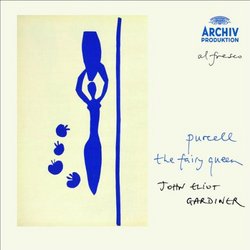| All Artists: Henry Purcell, John Eliot Gardiner, Timothy Penrose, Ashley Stafford, English Baroque Soloists, Eiddwen Harrhy, Judith Nelson, Elisabeth Priday, Jennifer Smith, Wynford Evans, Martyn Hill Title: Purcell: The Fairy Queen Members Wishing: 0 Total Copies: 0 Label: Archiv Produktion Original Release Date: 1/1/2007 Re-Release Date: 11/13/2007 Genres: Pop, Classical Styles: Vocal Pop, Opera & Classical Vocal, Forms & Genres, Theatrical, Incidental & Program Music, Historical Periods, Baroque (c.1600-1750) Number of Discs: 2 SwapaCD Credits: 2 UPC: 028947767336 |
Search - Henry Purcell, John Eliot Gardiner, Timothy Penrose :: Purcell: The Fairy Queen
 | Henry Purcell, John Eliot Gardiner, Timothy Penrose Purcell: The Fairy Queen Genres: Pop, Classical |
Larger Image |
CD Details |
CD ReviewsA voice teacher and early music fan George Peabody | Planet Earth | 05/31/2009 (4 out of 5 stars) "A QUOTE FROM 'PROLOGUE TO THE FAIRY QUEEN'(1693): "WHAT HAVE WE LEFT UNTRY'D TO PLEASE THIS AGE, TO BRING IT MORE IN LIKING WITH THE STAGE? WE SUNK TO FARCE, AND ROSE TO COMEDY; GAVE YOU HIGH RANTS, AND WELL-WRIT TRAGEDY......"
'The Fairy Queen' was first performed on May 2, 1692, at the Queen's Theatre, Dorset Garden, London, possibly, as a birthday tribute to Queen Mary. Based on an incident in Shakespeare's 'Midsummer Night's Dream', Henry Purcell's 'Fairy Queen' is extraordinarily beautiful and contains some of the most inspired arias penned for the English language. The tale is a joyful fusion of music, dance and comedy which brings alive the splendor of the Baroque for a modern audience. The score, which is only partially in Purcell's autograph, has served as the basis of the edition specially prepared by Peter Holman and John Eliot Gardiner for performance at the 1981 Gottingen Handel Festival and the subsequent recording. The four-part Baroque Orchestra consists of: oboes and bassoons, double violin and bass parts which follows both English and French traditions. The surviving music that Purcell composed for the 1693 revival is here recorded complete for the first time(1981). Upon listening to it for the first time, one attempts to be logical and follow the 'story' which is really not obvious or all that important, and tends to get in the way of enjoyment of the music. There are nine Masques contained within five acts, all portraying various scenarios intertwined with the lovely music of Purcell. The First Act consists of fairies pinching and tormenting a drunken poet, while the Second Act meditates on the misunderstandings of the lost pair of lovers in Shakespeare's play and rhapsodises on night, sleep and mystery. The Third Act is a bucolic romp in which the drunken poet chases Mopsa(male singer)playing a female/male role; you name it. Act Four is a panorama of the seasons, and Act Five is an inexplicable Chinese Pantomime. This recording is somewhat of a disappointment for me because after hearing the Harnoncourt 1994 disc with his line-up of very excellent soloists(B.Bonney,E.VonMagnus,S.McNair,M.Chance,L.Dale,R.Holl and A.Michaels-Moore) and the skilled Arnold Schoenberg Choir, I really expected Gardiner's recording (I so love his M.Choir)to at least be on that level. Thus I had to keep reminding myself that this 1981 disc was early in Gardiner's sojourn, and I do think that if he recorded it today, he certainly would select more accomplished soloists. All ten of his soloists were skilled singers, but dramaticlly, except for three, namely J.Smith(soprano), M.Hill(tenor) and S.Varcoe(bass), the remaining seven gave correct, but dull renditons. And this music is far from dull!!!! For example, the absolutely marvelous scene between the drunken poet (David Thomas) and the 'gay' guy (Timothy Penrose) fell flat on its face; totally lackluster, and there were many such failures. It seemed to me that Gardiner was attempting to assign solos to as many of his choir members as possible, but 'Too many cooks spoil the pot'. Gardiner's Monteverdi Choir was superb as were the English Baroque Soloists, thus the four stars (they deserve 10) BUT in this work at least seventy-five percent of the singing is solo work, so there you have it. I am far from 'trashing' this disc for after all it has one of my favorite choirs, but in all honesty I have to award the overall excellence to the 1994 Harnoncourt disc and 'The Sixteen' 1990 recording. Just a purchasing 'tidbit': the other Fairy Queen of Gardiner's with a different picture is the same recording, but more expensive. " |
